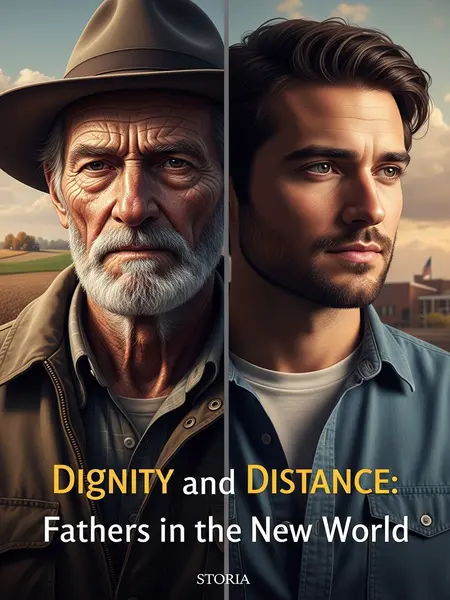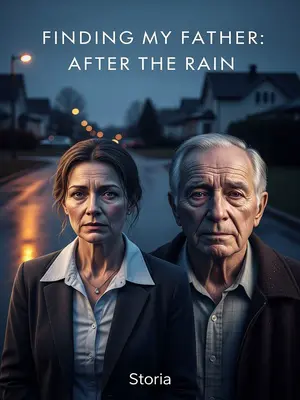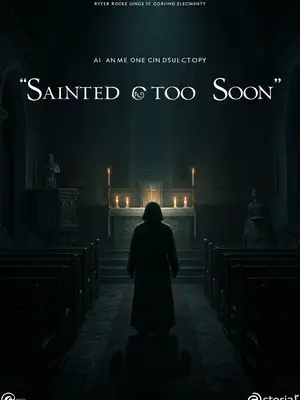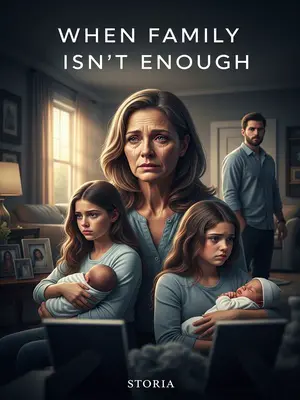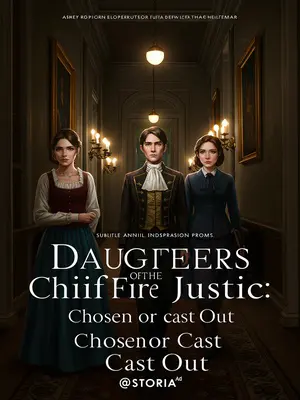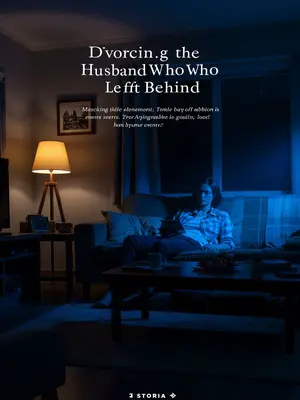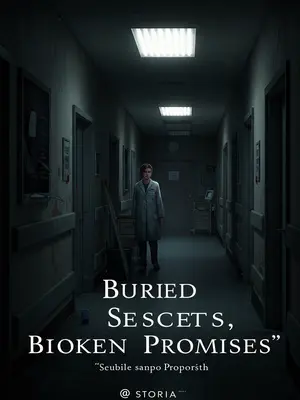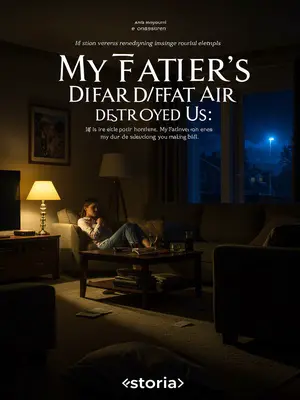Chapter 4: Lessons in Silence
I like to imagine the relief flooding through him, the way he must have slumped against the wall, tears in his eyes. Sometimes, the happiest moments are born from the darkest fears.
“A boy, seven and a half pounds, mom and baby are fine.”
Those words must have sounded like a miracle. In that instant, the world righted itself, and for the first time in a long while, Old Hank could breathe easy.
Old Hank picked me up. The flesh and blood in his arms let him finally step out from the shadow of history and move toward something better. He wasn’t just a survivor anymore—he was a dad.
There’s a photo from that day—Old Hank in a wrinkled shirt, eyes red-rimmed, holding me like I was made of glass. My grandma stands beside him, smiling through her own tears.
It’s the beginning of something new, a promise that life goes on.
That night, Old Hank had a dream. He dreamed of his childhood self following his father through the old alley. Down the dirt road, always turning left, then left again, finally reaching the bridge, but the bridge was empty, nothing there, his father long gone. Feeling lost, he suddenly turned around and was surprised to see his childhood self, calling out: “Dad, I finally caught up with you.”
Funny how dreams tie the past and present together. Maybe, in that dream, he found a kind of peace—a sense that, at last, he wasn’t alone on the road anymore.
Childhood
Maybe because he’d faced death twice, Old Hank gave me a weighty name—Hank Y. Ellis. The Y? He’d just say, “Why not?” but I always wondered if it meant something more.
He never explained it, but I always figured it was his way of telling me to keep asking questions, to never settle for easy answers. There’s a kind of hope in naming your son after yourself, and a kind of challenge in adding that “Why.”
There’s a poem by Robert Hayden called “Those Winter Sundays”:
Sundays too my father got up early
and put his clothes on in the blueblack cold,
then with cracked hands that ached
from labor in the weekday weather made
banked fires blaze.
No one ever thanked him.
I remember reading those lines in high school, feeling a jolt of recognition. Old Hank was that kind of father—the kind who did what needed doing, whether anyone noticed or not.
Old Hank was like a tractor—tall, silent, always moving. He’d run between the power plant and job sites during the day, always busy with endless chores at home at night.
He was a man in motion, never still for long. Evenings found him fixing leaky faucets, oiling squeaky hinges, or tinkering with the old Chevy in the garage. He moved with purpose, every gesture measured, like resting was a luxury he couldn’t afford.
He wasn’t the kind of dad who played catch or told jokes. When we were together, it felt more like a general and a little soldier than father and son.
I’d watch other kids in the neighborhood tossing footballs with their dads, laughing over backyard barbecues. With Old Hank, it was different.
Our bond was built on routines.
There was a market on the east side of Detroit. When I was little, I often went with Old Hank, sometimes to pick up flour or apples, sometimes to get peanut butter or a new wrench. The road to the market was long and boring, bumpy with broken pavement, and each trip took a few miles. Old Hank didn’t talk much. I always asked when we’d get there, and he’d just say, “Soon.”
The drive always felt endless—me in the passenger seat, legs swinging, counting cracks in the dashboard. The air smelled like motor oil and Old Spice. Old Hank’s eyes stayed fixed on the road, his hands steady on the wheel. I’d ask, “Are we there yet?” and he’d just grunt, “Soon.”
It became a running joke, though neither of us ever laughed.
He never stopped for snacks, just went straight for the stew or a burger. I just sat there, trying to act grown-up, eating my food in silence, surrounded by a bunch of men who all seemed to know each other.
I’d watch him order—no nonsense, always the same thing. He’d slide the plate in front of me, nod once, and dig in. I learned early not to ask for fries or a soda. It wasn’t stinginess; it was just his way. The world, to Old Hank, was made up of essentials. Everything else was a distraction.
Once, my mom was with us. It was hot, and she bought me a popsicle from a street vendor. The cold, creamy flavor filled my mouth, and I ate it with joy. Old Hank looked at me like he’d never seen a kid eat a popsicle before.
He looked at me like I’d just discovered fire. Maybe he’d never thought about what kids liked, or maybe he’d just forgotten what it was like to be a child. My mom winked at me, as if to say, "Let him learn."
It was the first time Old Hank realized that kids liked popsicles.
He seemed genuinely surprised, as if this tiny pleasure was a revelation. For a man who grew up with so little, small treats must have seemed like luxuries reserved for someone else.
After that, every time we went out, he’d buy me a popsicle. We’d always stand side by side on the steps outside the 7-Eleven—me sweating as I gnawed on the popsicle, him standing next to me like Clint Eastwood in a Western, stone-faced.
It became our ritual. He never bought one for himself, just stood watch while I ate, his arms folded, scanning the parking lot like a sheriff on patrol. The world felt safe when he was there, even if he never said a word.
Years later, I lost interest in popsicles. When we went out and saw a convenience store, he still always asked if I wanted one. I’d scoff, “No,” and Old Hank would look lost, as if he’d lost his secret weapon.
He’d stand there, hand hovering over his wallet, unsure what to do next. I could see the disappointment in his eyes, though he’d never admit it. It was one of the few ways he knew how to connect, and now I’d outgrown it.
After all, it was one of the few ways he knew to make me happy.
Looking back, I realize how hard he tried, in his own way.
Love, for Old Hank, was practical—a sandwich, a ride to school, a popsicle on a hot day. He didn’t have the language for affection, so he used what he had.
As a kid, I liked washing up with Old Hank.
Our bathroom was small, the mirror spotted with toothpaste flecks. I’d stand on a stool, brushing my teeth, sneaking glances at him as he loaded a fresh blade into his razor. The smell of shaving cream and aftershave filled the air, a scent I still associate with safety.
Every time, I’d brush my teeth while glancing sideways as he slowly loaded a sharp blade into his razor; then he’d soak a towel in hot water and cover his face. Only after I finished brushing my teeth would he slowly and carefully shave his barely-there stubble.
He moved with the precision of a craftsman, each stroke deliberate. I was fascinated by the ritual—the hiss of the hot towel, the soft scraping sound, the way he’d tilt his head to catch the light. It felt like watching a magician at work.
Sometimes, while he was washing his hair, I couldn’t help but pick up the razor and run it over my own face, pretending to shave just like him. The cold handle made my skin tingle. When Old Hank, his face covered in shaving cream, caught me at it, one eye would pop wide while the other, stung by soap, squinted into a slit, making a funny face. He’d let out a disapproving “Hey!” and quickly but carefully snatch the razor away, his expression serious—like, “This isn’t a toy.”
